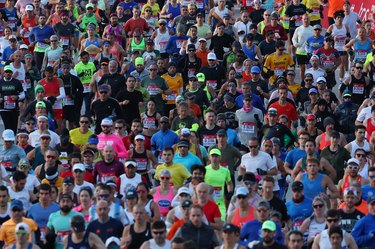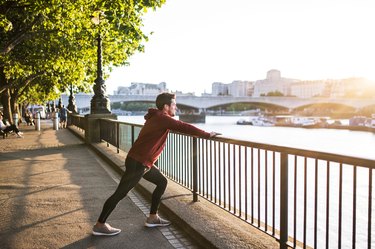
After training for months, sacrificing your weekend mornings to appease the long run gods, and finally crossing the finish line, you find yourself sick after running your marathon. It turns out, it's normal to feel sick after a race — and it's more common than you might think.
Most studies point to training volume as a precursor to illness. A classic, often-cited January 1990 study in the Journal of Sports Medicine and Physical Fitness found during the two-month period before the Los Angeles Marathon, runners who completed 60 miles per week doubled their odds for sickness after the race compared to those training less than 20 miles per week.
Video of the Day
Video of the Day
It also showed 1 in 7 runners became sick following the race. Since then, researchers have worked to find out why this happens. (It's worth noting more and more recent research is still needed.)
Here, we'll take a look at what might be causing you to feel terrible, what goes on inside our bodies during a marathon to cause illness and how we can prevent and treat the dreaded marathon flu.
3 Reasons You Might Feel Sick After a Marathon
Erica Coviello, RRCA-certified running coach, has seen her athletes get wiped out post-marathon. "It could be a combination of things," she tells LIVESTRONG.com. "A marathon totally depletes you, and there are a few reasons why you might feel awful."
1. Gastrointestinal Issues
"When you hear about people needing bathroom stops and their gut being totally destroyed, it's usually because when you're running the marathon, your [physical] stress levels go high," Coviello says. "It puts you into that flight or fight response mode, and in doing that, your blood flow changes and your body is like, 'What the heck is going on?' It reroutes the blood to essential organs and away from your gut."
This is the leading theory behind why you might feel nauseous or like you are going to have a number 2 emergency mid-race. But, according to Coviello, this can actually continue on for several days after your marathon.
2. Post-Marathon Depression
Perhaps just as common as the marathon flu would be the marathon blues, which is a feeling of loss and sadness following the race.
"You spend so much time and so much of your schedule regimented toward that one event," Coviello says. "Whether you completely crush your goals or you have completely failed, that's the climax. Then you've got a day or two of celebration and then many people wonder what they are supposed to do now."
That void can feel like depression, and if you are diagnosed with depression or anxiety, it can exacerbate symptoms.
"There is a real physical manifestation of that," Coviello says. "And if that's why you feel crappy, you have to treat it like a real thing to recover."
3. You Have a Virus or Infection
For many reasons that we'll get into below, the marathon flu is usually just that: a real flu, cold, sinus infection or other virus that requires rest and care.
What ‘Runner’s Flu’ Really Feels Like
Symptoms of runner's flu vary and can be wide-ranging. Most runners report feeling like they have a cold. You might have the sniffles and an annoying cough. The most important thing to keep in mind is that if you are dealing with an illness that was caused by the marathon, these symptoms should be fairly mild. You might experience:
- Runny nose
- Cough
- Fever or chills
- Body aches
- Headache
- General malaise
Of course, some of these symptoms could also come from allergies, and you might just need a shower and some anti-allergy medication.
But if you're experiencing vomiting, dark colored urine, extreme fatigue, severe muscle cramps and feel like you're dealing with more than cold or flu symptoms, head to your doctor to rule out more serious conditions like rhabdomyolysis.
Why You Get Sick After a Marathon
A January 2020 review in Exercise Immunology Review contends that athletes who partake in strenuous endurance exercise experience depleted immunity, and that "arduous bouts of exercise" have been associated with increased symptoms of upper respiratory tract infections. This could be due to several factors: environment, genetics, physical and mental stressors and underlying health conditions.
Ian McKeag, MD, assistant professor of family and community medicine at the University of Alabama at Birmingham's Medical School, explains how strenuous exercise (like running 26.2 miles in one go) affects the body.
"When you're running a marathon — or even a half-marathon — you're putting yourself through a lot of physical demands," he tells LIVESTRONG.com. "You're burning all sorts of energy, right? Spending glucose and glycogen, and the body is only really equipped for about an hour before it starts to pull from other sources. And as it starts to pull from some of those sources, that puts just more demand on the body as a whole."
Immunity dips, leaving us at risk for getting sick. There's also a lot going on with our hormones during training that can cause issues.
"When you are training for a marathon and persistently putting the body in that kind of stress, things like cortisol levels change," Dr. McKeag says. "That's a stress hormone that can have a negative impact on our immune response. That's one reason the immune system isn't as strong after running longer distances."
Another factor, according to Dr. McKeag, is exposure.
"If one thing over the past two years has become the forefront of popular knowledge, it's just how exposed you are by being next to others in the general public," he says. "On the day of the race, runners are put into a corral packed in with other runners, and there is a bottleneck for the first few miles of the race — you're going to be exposed to a big, diverse group of people."
Coviello agrees.
"If you travel to a race, you can pick up something there," she says. "And in the race, when your immune system is already compromised, you've got all these germs that are around you. Then you've got people that are throwing snot rockets all over the place. Then at the end of the race, you've got all these snot- and sweat-filled bodies, and everybody's hugging each other."
How to Prevent Runner's Flu
You're going to be run down, and we're all passing germs to each other all the time — even more so in big races. But even if the odds are stacked against your health on race day, Dr. McKeag and Coviello say not to despair. There are things you can do before the marathon to improve your chances of staying healthy.
"It's the other stuff that [runners] are not doing to take care of themselves throughout training, in my opinion, that is really putting them at the greatest risk," Dr. McKeag says. "Refueling, rehydrating, getting restful sleep and controlling stress — especially after any run greater than an hour."
Nailing your sleep and food intake are two things that can help make sure you're feeling your best before, during and after a marathon. If you want to be proactive, focus on micronutrients as well as macronutrients in your diet.
"You have to find your good ratio [of macros] and make sure you're getting enough calories from carbs, protein and fat," Coviello explains. "But your immune system also relies on the right micronutrients or vitamins or minerals, especially things like vitamin C, before the race so that your body isn't playing catch up."
Try these tips to start prioritizing your recovery:
How to Treat Your Symptoms Post-Marathon
When it comes to recovering from the marathon flu, there is no magic pill or potion. Patience and self-care are the name of the game. Dr. McKeag says the best remedies are the three golden R's: refuel, rehydrate and recover.
"Get some good sleep, get some good food in you and always, always stay well hydrated," he says.
Treat your symptoms like you would any other cold or flu: Drink warm and soothing fluids, hydrate with water and electrolytes, take pain relievers as needed and eat nourishing foods with vitamins, minerals and protein.
Your body will need rest, so don't get hung up on missing miles, especially if you have a fever.
"If your temperature is anywhere above 100.4 degrees Fahrenheit, you should not exercise — no ifs, ands or buts," Dr. McKeag says. "And if you just feel like crap, take time off training."
Even if you're not sick, Coviello advises taking a full two weeks off of running after a marathon to give your immune system, muscles, heart, lungs, stomach and brain a chance to fully recover.




